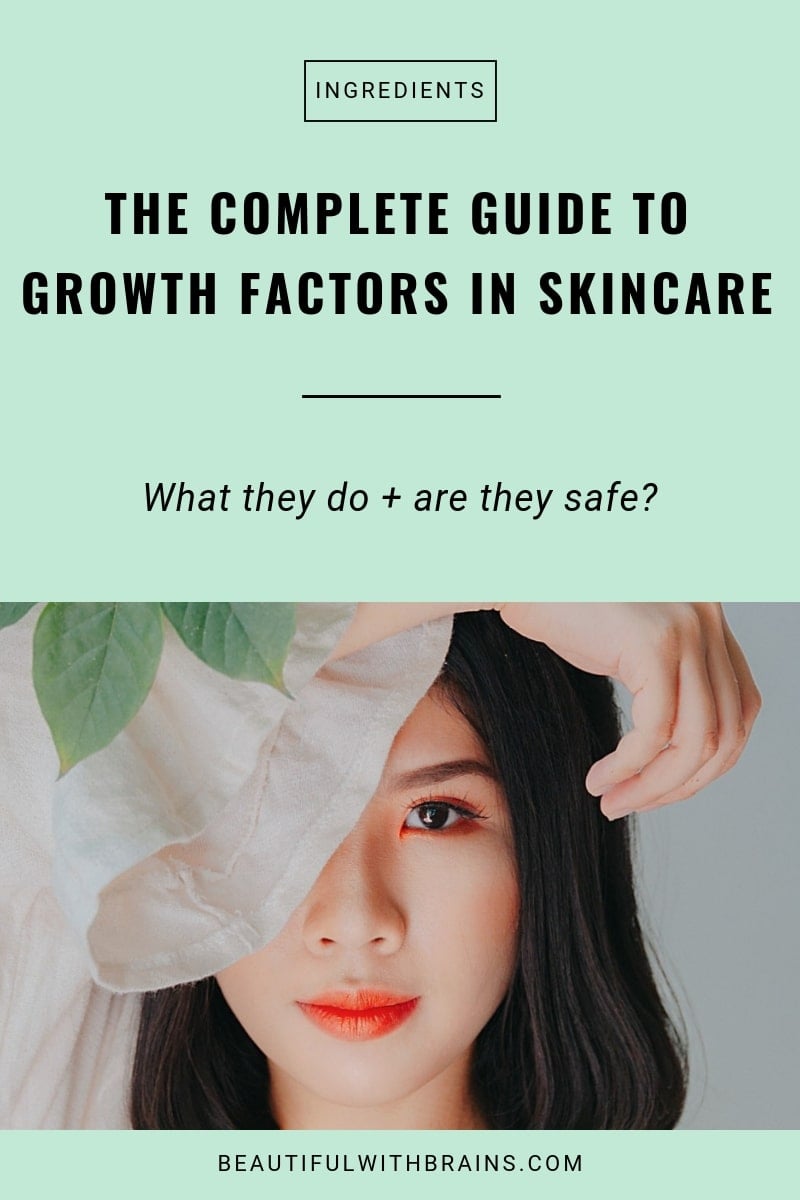
I admit it. I’m late to jump on skincare trends.
I don’t care about how well an ingredient works. I need to know it’s safe before I put it on my skin. Don’t you feel the same?
That’s why I’m currently on the fence about growth factors. On the one hand, they’re said to repair skin, boost collagen and get rid of wrinkles (and who doesn’t want that?). On the other, no one bothered to study if they’re dangerous in the long run. Hmmm…
Should you take the plunge? Here’s everything you need to know about growth factors and why I think it’s a little too premature to add them to your skincare routine yet:
What Are Growth Factors?
Growth factors are natural proteins in your body that support your skin’s natural signalling properties. In plain English, they tell your skin cells how to be behave.
They tell some cells to produce more collagen to keep your skin firm. They order others to repair broken skin. You get the drill.
Now, your skin can do this on its own. When it’s young and healthy. But as you grow old, the levels of growth factors start to decline. With less growth factors around, your skin can’t do the signalling job well and everything starts going south.
Struggling to put together a skincare routine that minimises wrinkles, prevents premature aging, and gives your complexion a youthful glow? Download your FREE “Best Anti-Aging Skincare Routine” to get started (it features product recommendations + right application order):
How Do Growth Factors Work?
As a group, growth factors make aging and damaged skin look better. Individually, each growth factor has its own specific job to do. Here are a few examples:
- Fibroblast growth factor (FGF1): Promotes cellular regeneration
- Hepatocyte growth factor (HGF): It boosts collagen
- Interleukins-10, -13, -15: They help skin heal faster and soothe inflammations
- Keratinocyte growth factor 1: Stimulates epithelial cell growth
- Platelet-derived growth factor: Regulates cell growth and division
- Transforming growth factor beta (TGF-ßI): Stimulates collagen production and speeds up wound healing
In other words, growth factors help skin repair itself, boost collagen and soothe inflammation. All things that help your skin fight wrinkles and stay younger for longer.
Related: 8 Science-Backed Ways To Rebuild Lost Collagen
Can Growth Factors Penetrate Your Skin?
In skincare, size matters. As a rule, anything that is larger than 15,000 Daltons can’t penetrate skin. And if something can’t penetrate skin, how can it stimulate collagen production and do all the other things growth factors are said to do?
Growth factors may just be the exceptions to this rule. Like peptides, growth factors work even when left on the surface of the skin. How?
Think of growth factors like messengers. They bind to receptors on the surface of the skin, telling them how cells should behave. This message is then carried all the way to those cells buried deep into your skin. Those are the cells that can boost collagen, produce elastin and do all the important antiaging jobs.
Related: Peptides In Skincare: Do They Really Work?
Are Growth Factors Safe?
We. Don’t. Know.
It was later dismissed because it’s really difficult to demonstrate that growth factors can cause cancer – especially when cancer is sadly a common disease that has many causes.
Still, this leaves some questions unanswered.
Let’s be clear. I don’t believe growth factors cause cancer. I didn’t see any proof they do. But there’s a small chance that the way they work can encourage the formation of cancer. Let me explain.
Growth factors encourage cellular regeneration and proliferation. In theory, it’s possible that if they signal pre-cancerous cells to multiply, the result may eventually be cancer indeed.
BUT, there’s no proof that this happens in practice. There’s no proof it can’t happen either.
In other words, we have plenty of studies that prove growth factors boost collagen, reduce the appearance of wrinkles and keep your skin young but very few proving their safety (or lack of it).
What does this mean? Well, for the time being I’m giving them a pass and stick to tried and tested antiaging powerhouses like retinol and vitamin C.
If you’re the type who prefers to avoid any ingredients with a bad rep even when science says they’re safe (parabens, anyone?), I encourage you to do the same.
If you’re a bit more adventurous, I guess you’ve already given them a go. Just don’t forget to go to a derm for your annual checkup.
Related: 5 Antiaging Superstars You Should Include In Your Skincare Routine
SHOP ANTI-AGING ALTERNATIVES TO GROWTH FACTORS
The Bottom Line
Growth factors are some of the most intriguing ingredients in modern skincare. They boost collagen, soothe inflammation and fight wrinkles. I’m just not convinced we have enough proof of their safety yet.

